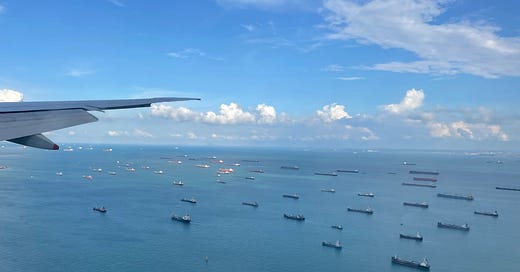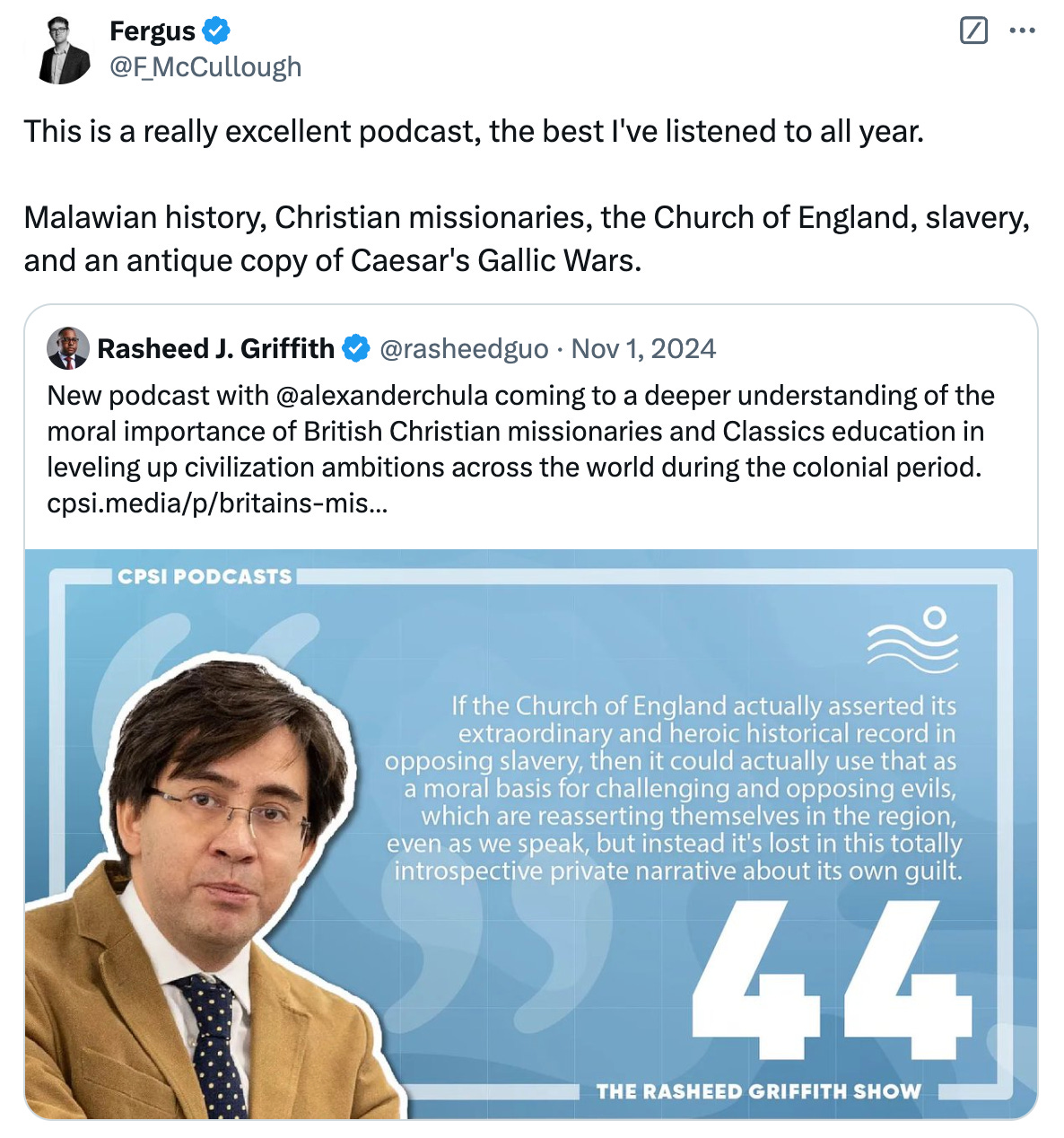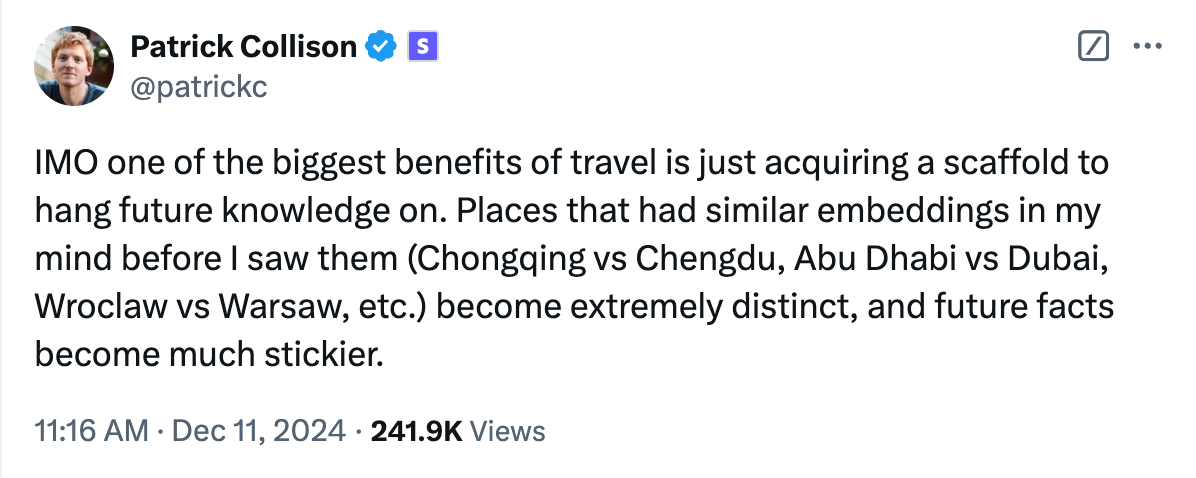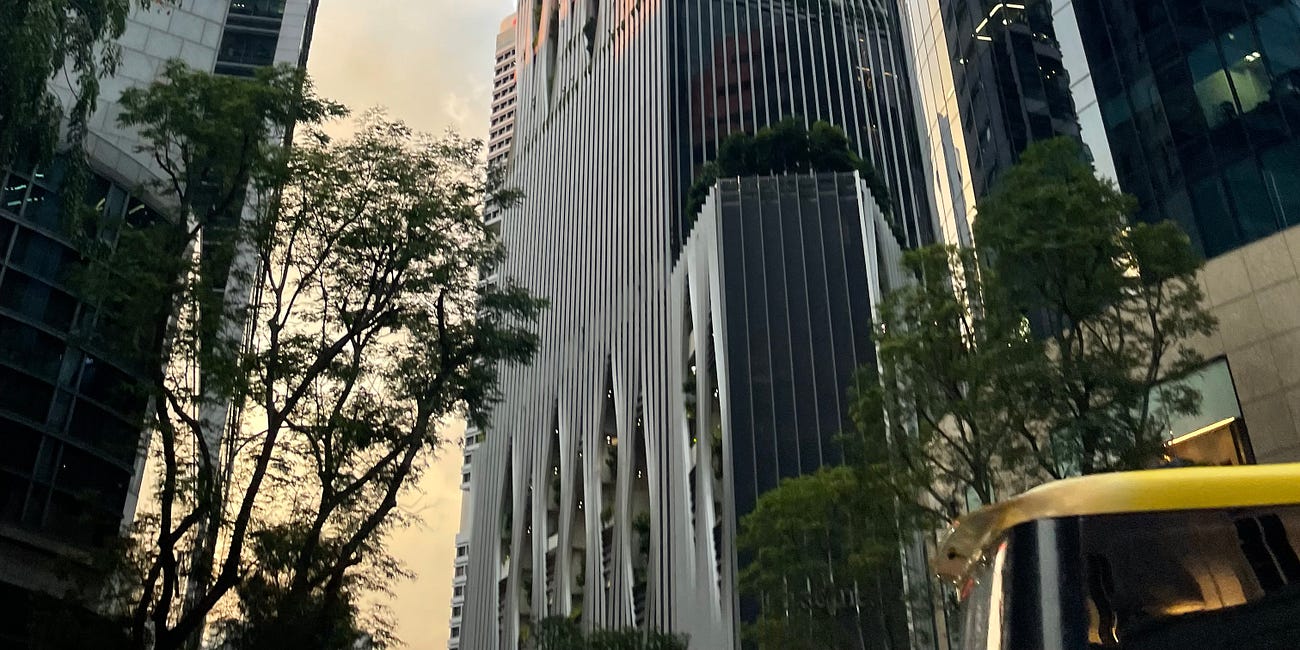Reading
I read a total of 43 books (cover to cover) in 2024, slightly more than last year. My favourites, grouped by category, were as follows:
Business
Brent Schlender and Rick Tetzeli, Becoming Steve Jobs. A great rejoinder to Isaacson’s overly critical biography. Jobs learned to master his foibles, driving Apple to a position so commanding that the firm is still living off his successes today (no disrespect to the excellent Tim Cook).
Steve had assembled a group that was strong enough to deal with who he was, and autonomous enough to compensate for his weaknesses. They developed their own tactics for managing him. “It was like we had a common enemy,” says Rubinstein. Members of the team would meet regularly with one another to plan how to get Steve to authorize the decisions they felt would be best, to figure out a way through or around Steve’s more imperious or ill-considered decisions or prejudices, and to try to anticipate where Steve would steer things next. They had the sense that Steve knew this was going on behind his back. “He knew that he could count on us to make things work,” says Tevanian, “even when there was friction or problems. We faced some really hard problems, you know, and he knew he could trust us to do the right thing.”
Michael Dell, Play Nice But Win. Michael Dell is rarely lauded like Jobs, Zuckerberg, and Bezos. But his achievements are just as impressive: his eponymous company achieving success over multiple computing eras. He’s been CEO almost the entire time, keeping things in founder mode. I enjoyed this snapshot of a CEO’s schedule:
On Tuesday the twenty-eighth it was back to the office, where I had to prepare for our annual industry-analyst conference on the twenty-ninth, an all-morning meeting with hundreds of analysts from firms like Gartner, IDC, 451 Research, Forrester, and others. For about six hours I would have to spend every minute giving analysts an upbeat view of our transformation and politely fending off what were sure to be persistent questions about the go-private negotiations. On the thirtieth I was to go to Toronto to meet with customers and our team in Canada. The next day I was to head to Washington, DC, to get together with our daughter Kira, who was doing an internship there. I would spend Saturday the first with her, then fly that night to Bangalore, India, where I was to meet with our team on June 3 (you lose a day traveling East). Then it was off to Beijing on the fourth; Chengdu, China on the fifth; then back to Austin on Friday the seventh to prepare for a Lieberman family reunion (Susan’s family) over the weekend.
History and Politics
Lee Kuan Yew, From Third World to First. Superlatives are redundant when it comes to LKY. An object lesson that great things are possible with vision and fortitude. Best read along with the earlier volume of his memoirs, which shows just how difficult the situation was at independence. (The defeat of the communists alone should be the subject of a TV drama.) Birth rates in Singapore, however, suggest that there is something ultimately missing from the PAP version of the good life.
Robert Caro, The Years of Lyndon Johnson: Means of Ascent. Great things have already been said about this series. The questions I’m left with are: how does Caro continually gain the trust of his interviewees when it’s clear he won’t pull any punches? And how has the electoral fraud/corrupt influence dynamic evolved over time in the United States?
Christian
D. A. Carson, Memoirs of an Ordinary Pastor. Lots of Christian biographies, whether about missionaries or leading ministers, end with the subject achieving prominence and success. Sometimes this comes after decades of obscurity. Rare is the Christian book written about someone who was obscure and seemingly unsuccessful throughout their life. Crucially, though, Don Carson’s father was faithful. And that’s really what this book is about.
Never in our hearing, and certainly not in his papers, did Tom express any jealousy of or malice toward other ministers who seemed to be eclipsing him, but whether he realized it or not the way was being paved to generate in him a feeling of inferiority with which he would wrestle for the rest of his life. Compared with some of the more dramatic turns around him, his ministry was ordinary.
Kevin DeYoung, Men and Women in the Church — clear biblical thinking on an important topic. How many people are effectively memeing themselves into a kind of complementarianism in regular life these days anyway? I particularly appreciate that he attempted to outline how masculinity and femininity can be positively expressed in people’s lives.
J. Gresham Machen, Christianity and Liberalism. This book is a century old but its skewering of liberal Christianity remains completely on target. One of the best antidotes to religious liberalism is simply to read a gospel from start to finish. Jesus isn’t saying all the things you might have expected!
In view of the lamentable defects of modern life, a type of religion certainly should not be commended simply because it is modern or condemned simply because it is old. On the contrary, the condition of mankind is such that one may well ask what it is that made the men of past generations so great and the men of the present generation so small. In the midst of all the material achievements of modern life, one may well ask the question whether in gaining the whole world we have not lost our own soul. Are we forever condemned to live the sordid life of utilitarianism? Or is there some lost secret which, if rediscovered, will restore to mankind something of the glories of the past? Such a secret the writer of this little book would discover in the Christian religion. But the Christian religion, which is meant, is certainly not the religion of the modern liberal Church, but a message of divine grace, almost forgotten now, as it was in the Middle Ages, but destined to burst forth once more in God’s good time, in a new Reformation, and bring light and freedom to mankind.
Fiction
Elena Ferrante, My Brilliant Friend and The Story of a New Name. The former took me two attempts to really get into, but once it gets going you just can’t look away. I enjoyed the portrayal of postwar Naples and the awful scramble out of poverty — probably similar to the experience of a lot of people in Ireland some decades ago.
Podcasts
There are easily too many good podcasts for me to listen to these days. Some can be read via transcript, of course, but I’m convinced that it’s uniquely enjoyable to actually hear smart people talk through interesting questions. (Or maybe I just don’t like to be bored when I go for a run.)
The two best podcasts remain Dwarkesh Patel and Tyler Cowen. Dwarkesh in particular has gone from strength to strength this year — much like Tyler, you might think an episode looks daunting or perhaps outside your areas of interest, but when you listen it’s rarely disappointing. The best single episode was Leopold’s:
I didn’t listen to as many of Tyler’s episodes this year as previous years, but there were some gems in there. Stephen Kotkin’s appearance in particular was excellent. It’s a hard episode to excerpt because the best bits are the long stories he tells — there must be so many more from across his career. Christopher Kirchhoff and Benjamin Moser were also great.
Elsewhere, I particularly enjoyed Rasheed Griffith interviewing Alexander Chula on Malawi:
Films
Letterboxd tells me I watched 42 films in 2024. While I don’t have the sophisticated taste of some of my friends, I’m pleased with the films I rated most highly — they all speak to our times in some way:
Dune: Part Two (2024): As Tyler likes to say, the important thinkers of our future will be religious ones.
Children of Men (2006): I’m a real sucker for extended action sequences shot by a single camera, and this film has several terrific ones. The film’s concern with birth rates is very prescient, of course, and even the London rickshaws in the opening scene has proven rather accurate.
Hell or High Water (2016): on some level, this is a story about unhappy rural Americans fighting back against the system. Themes: decaying regions, limited job opportunities, gambling.
Travel
There has been some discourse about travel recently. Patrick Collison tweeted:
Dwarkesh noted in his recent China post:
So what's the point of travel? What about the in person experience can't be replaced by books, travel vlogs, and Zoom calls? For me, it's something like, what becomes salient to you. I started asking questions about China I hadn't even thought to ask about America.
Both of those points are correct. In addition, travel makes you realise that things can be different. Economic development, personal safety, urban design, almost everything.
This sounds trivial, but it’s one of the most important lessons of all. Many smart people have already internalised this to some degree, but have you really internalised it enough?
For instance, Singapore really is a lot safer and more pleasant than London. Their elites really are high quality. Not every state has been as deliberate in creating their country and its elites as Singapore, of course. The UK hasn’t set out to get worse in these dimensions. But it is possible to choose to be better.
As for my own travel, as well as a few trips to the United States, I visited several places for the first time:
Singapore
I already wrote about my trip to Singapore. I’m still thinking about it. (Thank you Civic Future for taking me. I strongly recommend applying to their Fellowship if you’re an early career person in the UK.)
Malta
Definitely worth the several days we spent there; decent historical sites and Valletta is decidedly pleasant to walk around. We happened to visit on the feast day of St Paul, so saw some marching bands celebrating!
I came away thinking that the Maltese are the Ulster Protestants of the south Mediterranean; they like marching bands, they’re loyal to the British Crown (voted in favour of unification with the UK in 1956), and judging by their museum they’re proud of defeating the Ottoman Turks, the (Napoleonic) French, and the Nazis.
Madrid
I’ve visited Spain before but never the capital. I think I spent most of my time in nicer districts, so discount these notes accordingly:
There were almost no overweight people.
People seem quite happy — smiling and laughing in public.
Most people seem to be quite stylish, and no one was wearing tracksuits. Overall people have a similar style (apparently strongly influenced by Zara?)
Most buildings are very nice, if not outright beautiful.
Medium density apartments are normal (unlike in the UK and Ireland).
There is lots and lots of good food!
Every major Western city has lots of immigrants, but Madrid has a bit of a advantage: their immigrants are almost entirely Latin Americans, so they speak Spanish already. I wouldn’t have even known they were immigrants except my host could identify their accents.
Marrakesh, Morocco
Overall Marrakesh wasn’t really my vibe. The city was pretty touristy. I don’t know enough about crafts to distinguish the high quality souks from the rest, and if I found them they wouldn’t really interest me.
However, there were several good aspects. It was interesting to see just how grindingly poor the old city was, and yet how it seemed quite safe (we were very soft targets for thieves but were unscathed). I particularly liked the House Of Photography Of Marrakech, especially the terrific 1957 documentary about Berbers in the Atlas Mountains. (It is online here, but unfortunately without English subtitles. A real progress studies film.)
Goals for 2025
It’s cliche to say it, but I really have to learn more about AI. Even if you’re a bit sceptical of benchmarks or the most AGI-pilled boosters, the progress in the field over the past few years has been undeniable. It’s the main thing going on, and perhaps only the birth dearth is of comparable impact.
I do think I know the basics, but there’s so much more to dig into, especially the industrial (data centres) and geopolitical angle. If you have any recommendations on this side, please send them to me or leave a comment.
In terms of reading, I was surprised by just how quickly I finished Caro’s Means of Ascent. It made me wonder whether I should focus on history books that are well-written in order to increase my throughput. Dan Schulz also has praise for this tier of history book.
To that end I hope to finish Caro’s LBJ series in 2025 — and who knows, maybe the last volume will come out soon… I’ve also started Albion’s Seed and Kotkin’s Stalin biography. I have high hopes for Ross Douthat’s forthcoming book, Believe: Why Everyone Should Be Religious, and hope to review it here.
I don’t think I’ll travel quite so much in 2025, but my highest priority places at the moment are in East Asia, especially Korea and Japan. Let’s see if I make it there.









Really enjoyed this, thanks Fergus